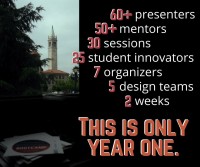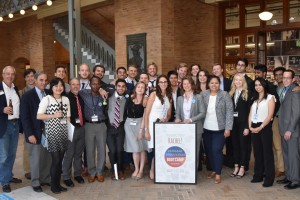Bootcamp Catalyzes Industry-wide Innovation Conversation
 To increase the presence of nuclear energy as a clean energy source in the United States and around the world, we need new ideas, we need old ideas in the form of new companies, and we need technologies to make the leap from the lab bench or computer simulations to the real world. The DOE GAIN initiative will make national lab resources more available for small nuclear companies and startups, but for GAIN to make real inroads in the industry, the industry needs more startups.
To increase the presence of nuclear energy as a clean energy source in the United States and around the world, we need new ideas, we need old ideas in the form of new companies, and we need technologies to make the leap from the lab bench or computer simulations to the real world. The DOE GAIN initiative will make national lab resources more available for small nuclear companies and startups, but for GAIN to make real inroads in the industry, the industry needs more startups.
In many ways, the Nuclear Innovation Bootcamp is our first "startup." It is a way to bring experts from nuclear and from Silicon Valley together, to bring highly accomplished students with big ideas into a room where they can learn to execute those ideas. The Bootcamp is the beginning of an alliance of the quiet but active community of innovators within ANS and the nuclear industry at large. It's an alliance a long time coming, and one that will be instrumental in changing nuclear energy - not just the technology, but also the public's understanding and our own understanding of what nuclear energy can - and will - be.
UC Berkeley Assistant Professor Rachel Slaybaugh, who first developed the idea of the Bootcamp, emphasized this in her closing speech: "We actually need to transform the workforce. We need people to start and work at startups. We need people in labs and industry to be excited to work together. We need people within all parts of nuclear to embrace moving forward, to question assumptions, to be agile, and to want to do things differently.... We need to embrace the diversity of ideas and approaches that characterizes what is special about innovation."
As nuclear engineering students ourselves, this really resonated. The need to connect people with ideas to the resources and means to execute them seems simultaneously obvious and impossible. Silicon Valley is famous because it encourages the proliferation of ideas, despite - or perhaps because - most of these ideas will fail. Nuclear, on the other hand, is well-known for our risk-aversion.
How do we bring these two apparently contradictory value sets together? The answer isn't easy. It isn't a technical question - we can't throw math up on the board until we solve it. It's an identity question. But this summer's program, primarily funded by DOE, was the first step towards trying to answer the question.
There were themes that emerged from the conversations speakers, students, and mentors had during Bootcamp. We consistently discussed the need for regulatory overhaul, the importance of communications, and ways to bring expertise from other fields into nuclear. The students brought their passion and new ideas to the table, and the participating experts provided crucial perspective about what has and hasn't worked in the industry so far. With primarily nuclear engineering backgrounds in both the students and the speakers, there were obviously technical conversations as well.
https://youtu.be/aicVAXorRq4
The students' backgrounds, however, were not exclusively nuclear engineering. More than a third of the students had additional education or certification in entrepreneurship, policy, economics, or other "creative" aspects that are crucial to the success of an idea. There were also more women and minorities than you usually see in the nuclear industry. This diversity generated a greater variety of conversations - when people with different experiential and educational backgrounds work together on a problem, we can avoid some biases and increase overall creativity.
The students had two weeks to design a company that could benefit the entire nuclear industry. Their topics included personnel monitoring (Comm & Sense: Nuclear Plant Personnel Monitoring), consulting firms (Licensing Advanced Reactors Worldwide; Energy Technology Communications Hub (ETCH): Clean Energy Communication Platform), and technical solutions (Ma'at: Peaking and Hydrogen Production; Auzel: Energy from Waste).
The winning team, Auzel, designed a product to collect energy from nuclear waste heat through the use of photon up-scale converters and infrared photovoltaic cells. Their case study was based on the La Hague Waste facility in France; they intend to expand the market to include all high-level waste facilities and future applications. Auzel was selected by the judges on the basis of: the soundness and marketability of their idea, the identification of core competencies and associated risks, and the pitch itself.

Students, Judges, and Organizers celebrating a successful first year. Photo courtesy of Emily Nichols/Idaho National Laboratory
Auzel's idea was praised for its technical voracity and marketability. The team members were complimented on their commitment and excitement, and in return complimented the various mentors and industry members who pushed them to make their design better and more feasible. The team has already been contacted about ways to commercialize the design. Three groups, as a matter of fact, have had professionals from DC, industry, and the national lab network reach out about moving their ideas forward. The results of the inaugural Bootcamp are clear: students are ready to innovate and experts are ready to innovate. The industry is full of people who want to make these ideas a reality.
In her speech, Professor Slaybaugh said, "I went to innovation events, and everyone was confused why there was a nuclear engineer there." It was a laugh line, and the audience laughed. But why?
That this line spurred laughter is proof of the need for programs that support new ways of thinking in the nuclear industry. If Silicon Valley - the world of innovation; of new, outside-the-box, change-the-world thinking - looks at nuclear as a stagnant industry, how will we make the huge advances in energy technology that we know are possible?
The 2016 Nuclear Innovation Bootcamp had a theme: #NuclearUpended.
It wasn't about throwing away the past, but it was about upending our patterns of thinking. It isn't about destroying them, but it is about questioning them. About finding new practices in other industries that can make nuclear R&D easier. About finding customary practices in nuclear that can be marketed to other industries. Bootcamp is about making it possible to move nuclear energy forward faster. If you'd like to join us - as a student, mentor, speaker, or supporter - please email nuclearinnovationbootcamp@gmail.com.

